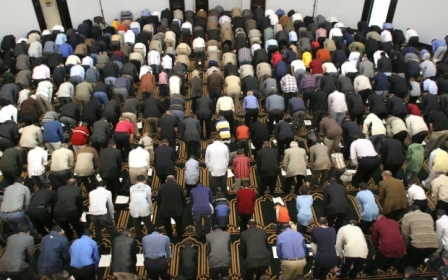BOOK REVIEW: The Arab Counter-Revolution and its 'Jihadi' Legacy

A common fallacy among the international community is to assume that every prime minister in the Middle East has the same amount of power. Politicians and the media got overexcited when Syrian Prime Minister Riyad Hijab defected in 2012, but he operated as a figurehead within the regime. Many ministerial offices often act like social salons and talking shops than the beating heart of government. Real power resides in the myriad of military and security agencies that dominate every facet of the state. Welcome to the so-called “deep state.”
Four years ago, the Arab Spring spawned library shelves of hastily drafted books proclaiming the dawn of a new era, celebrating the bravery and achievements of the new waves of protesters and the dynamic tools of social media.
However, this seemingly new dawn quickly faded into a bloody sunset. Those halcyon days have past as Syria, Libya, Yemen, Iraq, and Palestine face more destructive crises. Trying to understand each case's context and and complex interplay can become a labyrinthine task.
This violent reversal can be explained by use of the term "deep state".
The French academic and former diplomat Jean-Pierre Filiu has sought to address the shadowy role of the deep state in hitting back against these popular revolutionary forces.
The term deep state, first called "Derin Devlet", originated in Turkey 10 years before the turn of the 21st century. During that time, several Turkish military groups acting on behalf of the government operated in clandestine operates to suppress Kurdish independence movements. Until after the Arab Spring, nations in the Arab World were typically openly and unashamedly dictatorial, in other words, there was little deep about the manner and methods of their tyrannical control.
To chart this, he delves back to the very origins of state formation in the region, dividing the paths taken into two: that of Kemalism in Turkey and Wahhabism in Saudi Arabia, both of which aimed at crushing any Arab renaissance.
'Modern Arab Mamluks'
Filiu formulates a category of regimes in the Arab world he terms “the modern Arab Mamluks". The Mamluks, which translates into slaves, were the military elite that dominated much of the Islamic World for a thousand years before being finished off by Napoleon in 1798. Unfortunately for Filiu, he overcomplicates his narrative with too much murky historical discourse, which at times makes his arguement less clear.
The principal examples of the Mamluk states are to be found in Algeria, Egypt, Syria and Yemen, where the military runs the state apparatus, a single party with a nationalist ideology represses all dissent and plunders national resources. For Filiu, these states act predatory, feeding off oil revenues and patronage networks.
Not fully convincing is the way Filiu differentiates the Mamluk states from the totalitarian states of Saddam Hussein’s Iraq and Qaddafi’s Libya. The Arab monarchies have hardly been democratic and some have been highly involved in the counter-revolution. Saudi Arabia expressed outrage at the West for doing nothing to save Mubarak and allowing the Muslim Brotherhood to become Egypt's government.
Filiu elaborates on several key strategies that these Mamluk states deployed to stay in power. The first is the evil enemy that was used to justify their existence – the "jihadi" menace. He argues that the fragmentation of popular resistance movements helped spawn the rise of such groups.
During the Cold War, the West was held in the grip of fear over the terrifying Soviet communist threat. Now, religious groups in the Middle East are the ready-made replacement. For Middle Eastern regimes, their militant networks are the perfect excuse to undermine any democratic movements or indeed undermine neighbouring states. At the beginning of the Syrian uprising, Bashar al-Assad, terrified at the peaceful and democratic nature of the mass protests, released some of the most hardline Islamists and al-Qaida members, clearly to militarise the situation and undermine the democratic opposition.
External pockets
Filiu adds that military and intelligence leaders in Middle Eastern countries that allied with the US during President George W Bush's "War on Terror" campaign profited handsomely. This stream of gold was used to fund paramilitary organisations. The shining example of this was Ali Abdallah Saleh in Yemen, who manipulated external patrons to fund his own praetorian guard. All the regimes claimed, largely fraudulently, to have been fighting al-Qaida for years before the 9/11 attacks, while glossing over their own role in creating the conditions for the militants' successes.
The Mamluks also abused the Palestinian cause, frequently paying lip service to the issue as Palestinians suffered. The actions of Lebanon's government blockading Yarmouk refugee camp is matched by Egypt’s current brutal treatment of Palestinians in Gaza.
Filiu concludes that for any party to truly understand regional events and how to deal with ISIS they must understand the nature of the counter-revolution. Despite the brief period of rhetoric of supporting Arab popular aspirations and rights from 2010-2012, such sentiment has evaporated and the people have been abandoned. States, even ones with lamentable human rights records, are still seen as the best bet to defeat ISIS even as they act as their supreme recruiting sergeants.
This is an invaluable contribution to understanding the murky world of the Arab security regimes. As such, external policymakers would be well advised to digest Filiu’s prescient warnings.
From Deep State to Islamic State: The Arab Counter-Revolution and its 'Jihadi' Legacy by Jean-Pierre Filiu is published by Hurst and Company, 2015 London, (ISBN: 978-1849045469)
New MEE newsletter: Jerusalem Dispatch
Sign up to get the latest insights and analysis on Israel-Palestine, alongside Turkey Unpacked and other MEE newsletters
Middle East Eye delivers independent and unrivalled coverage and analysis of the Middle East, North Africa and beyond. To learn more about republishing this content and the associated fees, please fill out this form. More about MEE can be found here.




